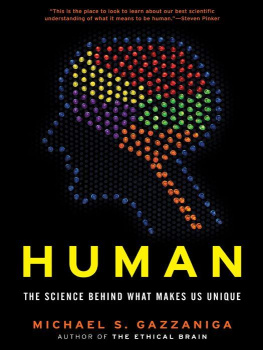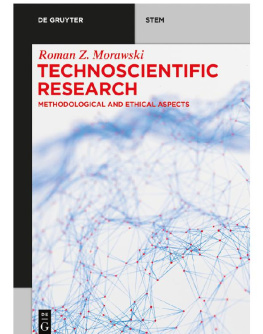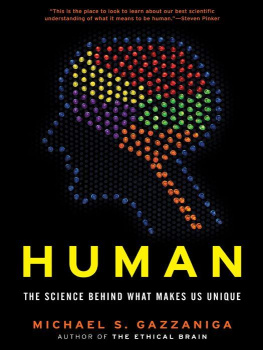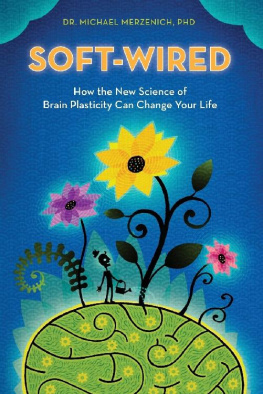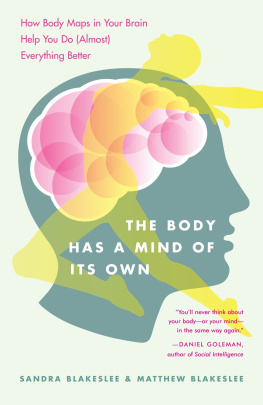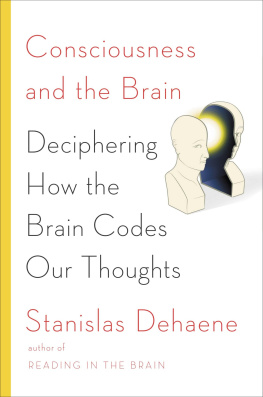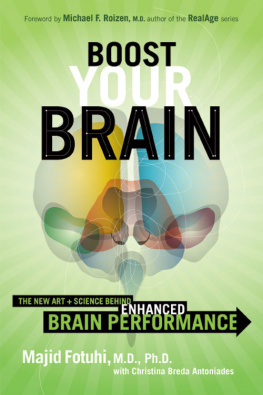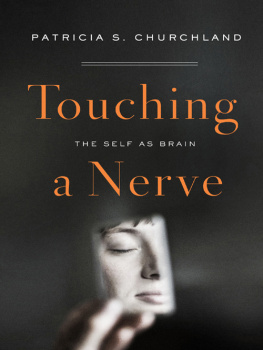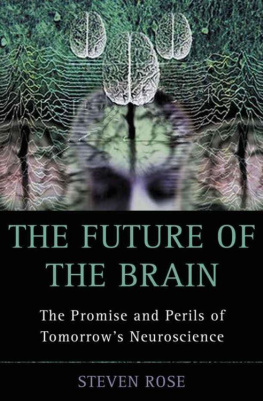Also by Michael S. Gazzaniga general reading
The Social Brain
Mind Matters
Natures Mind
Conversations in Cognitive Neuroscience The Minds Pastresearch monographs The Bisected Brain
The Integrated Mind (with Joseph LeDoux) textbooks
Fundamentals of Psychology
Functional Neuroscience (with Diana Steen and B. T. Volpe) Psychology
Fundamentals of Cognitive Neuroscience (with R. B. Ivry and G. R. Mangun)
Good Readings in Psychology (with E. P. Lovejoy) The Psychological Sciences (with Todd Heatherton)
edited scholarly works
Handbook of Psychobiology (with Colin Blakemore) Handbook of Cognitive Neuroscience
Perspectives in Memory Research
Neuropsychology: Handbook of Behavioral Neurobiology (Vol. 2)
Extending Psychological Frontiers: Selected Works of Leon Festinger (with Stanley Schachter) The Cognitive Neurosciences
The New Cognitive Neurosciences
Cognitive Neurosciences III
Michael S. Gazzaniga


New York Washington, D.C. Copyright 2005, all rights reserved
Published by Dana Press
New York/Washington, D.C.

The Dana Foundation
745 Fifth Avenue, Suite 900
New York, NY 10151
900 15th Street, NW
Washington, DC 20005
DANA is a federally registered trademark.
isbn : (cloth) 1-932594-01-91-932594-21-3 (eBook)
library of congress cataloging-in publication data
Gazzaniga, Michael S., 1939
The ethical brain/Michael S. Gazzaniga. p. cm
Includes bibliographical references and index. isbn 1-932594-01-9 (hardcover: alk. paper) 1. Cognitive neuroscienceMoral and ethical aspects. I. Title. qp360.5.g393 2005
174.2928233dc22
2004026860
Design by Kachergis Book Design Printed by Edwards Brothers Incorporated
www.dana.org DEDICATION
In memory of L. Gordon Bailey Who died young and needlessly in a room
empty of knowledge and ethics
Contents Acknowledgments ix Preface xiii
Part I Life-Span Neuroethics
Part II Brain Enhancement
Part III Free Will, Personal Responsibility, and the Law
Part IV The Nature of Moral Beliefs and the Concept of Universal Ethics
Endnotes 179
Index 195 Acknowledgments
Writing a book that touches on ethical and moral issues isnt easy for one who has spent a life in a neuroscience laboratory. The motivation is clear enough. Those of us who focus on how the nervous system works, and especially how it works to produce human cognition and self-awareness, must begin to address larger issues even though the ones we are working on are large enough. The journey was long and required the help of many fine and talented people, from the curious undergraduates at Dartmouth College to the bright and tireless graduate students and postdoctoral fellows and, finally, ones professional colleagues. Oh yes, I should never forget my talented family.
First the students. Back in the winter of 2002 my seminar on brain science started to examine practical social and ethical issues that grew out of understanding the basics of brain development, brain aging, brain enhancements, the brain basis for forming beliefs, and many other issues. Rich discussions gave birth, ultimately to many of the ideas I have tried to capture in this book. I am in their debt.
Subsequently, two Dartmouth students who had not taken that course also became interested in ethical issues as viewed from neuroscience. Jacob Waldbauer and I addressed the issue of free will in the legal setting. He went off to work at Stanford
ix x acknowledgments
and has now begun a graduate career looking at the nature of life in the universe through a joint program at MIT and Woods Hole. It was either that or make guitars in Wyoming!
Megan Steven who was finishing her work at Dartmouth and was about to become a Rhodes Scholar announced she had a deep interest in ethical issues. Megan actually served for a while on the Presidents Council before leaving for Oxford. Her interest developed, as did her work in neuroscience, and Megan helped do some of the basic research for each chapter, even though she somehow was also completing her doctoral studies. She and I also wrote a separate article on Free Will and the Law, and an adaptation of that article is part of this book. The Internet allows us all to remain one intellectual community. Megan represents what this book is about, an attempt to bring to the next generation of neuroscientists an awareness of the profound ethical issues that are and are not addressed by neuroscience. Megans fine research was essential.
My dear colleague Walter Sinnott-Armstrong, a philosopher with a huge appetite for life and for teaching the novicein this case meabout many of the complexities of philosophy, does what so few people will do: He spends his time trying to make your own work better. He read all the chapters and critiqued and advised on each of them, and I am in his debt.
I am also extremely fortunate to have my daughter, Marin, who loves to write about and edit complex topics. She is a playwright, a science writer, an editor, an actress, a producera just-about-everything young woman. Most of all she is a critic. Dad, this chapter makes no sense. So back to the drawing boards it was until I got it right. I cant thank her enough.
Finally, my thanks to the Dana Press and Jane Nevins. As they say in Texas, Jane is the real deal. She pores over a manuscript and does not hesitate to play hardball. This is great, this acknowledgments xi
isnt, this chapter needs to go, this has to be rewritten, and so on until the work is done. Again, my profound thanks to her and the rest of the Dana Press staff.
Of course, many others cant help but get involved, from my superb assistant Rebeca Townsend to others who read all or parts of the manuscript. It has been quite a ride, and I now gladly pass the baton to the next generation of brain scientists. It is your turn to broaden and deepen the many issues raised in this book. My thanks to one and all.
Michael S. Gazzaniga Sharon, Vermont Preface
A few years back I received a call from Leon Kass, the bioethicist from the University of Chicago. President George W. Bush had just appointed him to head a new council on bioethics, and he wondered if I might be interested in participating. We had all just been through the horror of September 11, and everybody in America was thinking about how to best serve and help our country. Naturally, I agreed, and I have never regretted the decision.
Nothing really prepares one for such assignments. When I took it on, I had never thought deeply about issues in bioethics. Dr. Kass assured me not to worry about that. It was to be a committee about bioethical issues, but not a committee of professional bioethicists. Most bioethicists are not scientists but rather philosophers, theologians, and others interested in public policy on morality. All points of view and varying kinds of expertise were wanted. I was supposed to help with issues in neuroscience.
Feeling a bit out of my league as I headed off to our first meeting, I told myself I would sit back and listen and learn. After all, bioethics was an area of study founded to monitor ethical issues involved in medical advancesfrom organ transplants to determining brain death. I am a Ph.D., not an M.D., but if ques
xiii tions related to neuroscience came up, Id be happy to supply the best information I could.
Those who know me might be amused to hear that this was my intention; they wont be surprised that, as it turned out, I couldnt keep quiet. We started with embryonic stem cell research, something that, to me, is an obviously needed field of study; yet many were opposed to it on grounds that seemed to have nothing to do with bioethics, let alone science. It became clear to me that the beliefs we all hold can color our judgments on issues that should be considered independently of personal belief systems. Having made a career of trying to understand how the brain enables the mind, I had some insight into how beliefs are formed and how they are deepened. It is a question that has fascinated me since I was a boy. I was raised in the Catholic faith, and the girl next door was a Protestant. Even within that small bit of belief variation, we each firmly believed in different things. Setting aside the large variations in belief that are represented by such different religions as Islam, Buddhism, and other belief systems, understanding how strong beliefs about anything become established in our minds has been a goal in my scientific life. As we will see, there is a brain mechanism underlying such phenomena, which when understood, leaves one with less of an absolutist view about all belief systems. Thus, I was none too thrilled to see the future treatment of debilitating diseases, never mind the future of our nations scientific research, being decided on the basis of such relativity. I began to feel neuroscience would have much to say on issues of bioethics.
Next page

